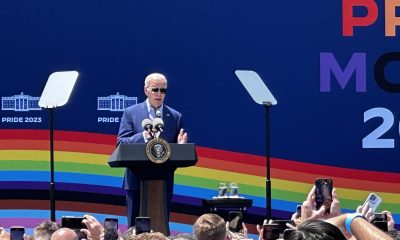National
Pelosi foresees ‘Don’t Ask’ end by year’s end
Speaker wants Obama to end policy administratively


House Speaker Nancy Pelosi spoke at the Gay & Lesbian Victory Fund Awards Gala (Blade photo by Michael Key)
U.S. House Speaker Nancy Pelosi (D-Calif.) on Wednesday reiterated her prediction that “Don’t Ask, Don’t Tell” would be a memory by the year’s end — despite the failure of the Senate last week to move forward with repeal legislation — as she maintained the president has the ability to stop troop discharges without a change in law.
Asked by a reporter whether she’s spoken with Senate Majority Leader Harry Reid (D-Nev.) about the Senate taking another shot at “Don’t Ask, Don’t Tell,” Pelosi replied, “That will be gone by executive — that will happen with or without Congress.”
“I don’t think it has to depend on whether it passes the Senate,” she continued. “The process will work its way through and the president will make his pronouncement.”
The speaker spoke to reporters after she gave a speech at the Gay & Lesbian Leadership Awards at the W Hotel, which was hosted by the Gay & Lesbian Victory Fund.
During her speech, Pelosi made similar assurances and promised that “Don’t Ask, Don’t Tell” will be “gone by the end of the year.”
“Some are here tonight who serve in the military,” she said. “God bless you for your courage and your patriotism. … But because of courage of some of them, this will be gone by the end of the year.”
Pelosi previously predicted in May that “Don’t Ask, Don’t Tell” would be “a memory” by the end of this year during an interview with the Hill newspaper.
Speaking to reporters, Pelosi said Congress got the ball rolling on repealing “Don’t Ask, Don’t Tell” to get lawmakers on record on the issue and so the change would be “in statute and all of that.”
The House in May passed an amendment that would repeal “Don’t Ask, Don’t Tell” as part of the fiscal year 2011 defense authorization bill.
“But even the bill that we passed said that it was contingent upon the recommendation of the president’s … review,” she said. “The only difference would be statute versus the president [making a policy change.]”
Pressed on whether she thinks the executive branch would ultimately be responsible for ending “Don’t Ask, Don’t Tell,” Pelosi replied, “That’s where it was anyway.”
“Others wanted to have more, so we tried to do more,” she said. “We’ll work very closely to try to see what happens after the election.”
Pelosi has previously said President Obama can issue an executive order to stop discharges under “Don’t Ask, Don’t Tell” without action from Congress.
Supporters of “Don’t Ask, Don’t Tell” repeal have been calling on Obama since the beginning of his administration to issue an order to stop the discharges under the law, but the president hasn’t taken such action.
Asked whether she would call on Obama to issue an order to end “Don’t Ask, Don’t Tell,” Pelosi replied, “That is the unfolding that we will see.”
“I’m very pleased with the course that the president’s on, but I think that they we shouldn’t be discharging people until that happens — so that, we have a little separation of — in terms of policy on that,” Pelosi said.
Pelosi added House members who support “Don’t Ask, Don’t Tell” repeal were “very disappointed” the Senate didn’t have sufficient votes to end a filibuster on moving forward with legislation that would end the law.
“In the Senate, the Republicans held up the bill entirely so it couldn’t even be considered, so it was very disappointing,” she said. “They went really out of their way to try to block this.”
Pelosi also reiterated her position that the Employment Non-Discrimination Act wouldn’t see a House vote until legislative action is complete on repealing the 1993 law barring open service in the U.S. military.
“I told everyone that right from the start — that if we want to go down the ‘Don’t Ask, Don’t Tell’ route, then we’d have to put ENDA in a different place,” she said.
Pelosi said initial plans for the 111th Congress were to take on hate crimes protections legislation followed by ENDA and then “Don’t Ask, Don’t Tell.” But she said the House ended up acting on “Don’t Ask, Don’t Tell” first before ENDA because there was “a lot of enthusiasm about changing the order.”
During her speech, Pelosi maintained the importance of the mid-term elections and said “the fabric of our middle class and strength of our democracy” is at stake.
Pelosi added that the election results will also “accelerate the pace of passing ENDA or set us back.”
The speaker said she believes the votes are in the U.S. House to pass ENDA, but expressed concern about a motion to recommit that could derail the bill.
The motion to recommit is a legislative manuever that opponents of ENDA could use to scuttle the bill when it comes to the House floor.
“I think we have the votes for it, but we have to resist the motion to recommit,” Pelosi said. “We can’t pass the bill unless we can resist all of the bad things that they could do to the bill along the way.”
Also speaking at the event were gay Reps. Barney Frank (D-Mass.) and Tammy Baldwin (D-Wis.).
During his speech, Frank emphasized the importance of keeping a Democratic majority in the next Congress and questioned those who would criticize lawmakers who support LGBT rights for the lack of progress on pro-LGBT bills.
“I understand people being unhappy about that,” he said. “What I do not understand is people who think that the way to respond to the fact that we weren’t able to get things done is further to empower the people who kept us from getting them done.”
Frank urged attendees to “bitch and fight” all the way to the polls to re-elect a Democratic majority in the U.S. House because Pelosi has been such a strong supporter of LGBT rights.
“Neither Tammy, nor I, nor anybody else has ever had to ask for her to support us,” Frank said. “We take that for granted and she has been the been the single most important public official in the history of the United States to be fully committed to our agenda not just as a matter of support, but as matter of her own personal involvement.”
The White House
Four states to ignore new Title IX rules protecting transgender students
Biden administration last Friday released final regulations

BY ERIN REED | Last Friday, the Biden administration released its final Title IX rules, which include protections for LGBTQ students by clarifying that Title IX forbids discrimination based on sexual orientation and gender identity.
The rule change could have a significant impact as it would supersede bathroom bans and other discriminatory policies that have become increasingly common in Republican states within the U.S.
As of Thursday morning, however, officials in at least four states — Oklahoma, Louisiana, Florida, and South Carolina — have directed schools to ignore the regulations, potentially setting up a federal showdown that may ultimately end up in a protracted court battle in the lead-up to the 2024 elections.
Louisiana State Superintendent of Education Cade Brumley was the first to respond, decrying the fact that the new Title IX regulations could block teachers and other students from exercising what has been dubbed by some a “right to bully” transgender students by using their old names and pronouns intentionally.
Asserting that Title IX law does not protect trans and queer students, Brumley states that schools “should not alter policies or procedures at this time.” Critically, several courts have ruled that trans and queer students are protected by Title IX, including the 4th U.S. Circuit Court of Appeals in a recent case in West Virginia.
In South Carolina, Schools Supt. Ellen Weaver wrote in a letter that providing protections for trans and LGBTQ students under Title IX “would rescind 50 years of progress and equality of opportunity by putting girls and women at a disadvantage in the educational arena,” apparently leaving trans kids out of her definition of those who deserve progress and equality of opportunity.
She then directed schools to ignore the new directive while waiting for court challenges. While South Carolina does not have a bathroom ban or statewide “Don’t Say Gay or Trans” law, such bills continue to be proposed in the state.
Responding to the South Carolina letter, Chase Glenn of Alliance For Full Acceptance stated, “While Supt. Weaver may not personally support the rights of LGBTQ+ students, she has the responsibility as the top school leader in our state to ensure that all students have equal rights and protections, and a safe place to learn and be themselves. The flagrant disregard shown for the Title IX rule tells me that our superintendent unfortunately does not have the best interests of all students in mind.”
Florida Education Commissioner Manny Diaz also joined in instructing schools not to implement Title IX regulations. In a letter issued to area schools, Diaz stated that the new Title IX regulations were tantamount to “gaslighting the country into believing that biological sex no longer has any meaning.”
Governor Ron DeSantis approved of the letter and stated that Florida “will not comply.” Florida has notably been the site of some of the most viciously anti-queer and anti-trans legislation in recent history, including a “Don’t Say Gay or Trans” law that was used to force a trans female teacher to go by “Mr.”
State Education Supt. Ryan Walters of Oklahoma was the latest to echo similar sentiments. Walters has recently appointed the right-wing media figure Chaya Raichik of Libs of TikTok to an advisory role “to improve school safety,” and notably, Raichik has posed proudly with papers accusing her of instigating bomb threats with her incendiary posts about LGBTQ people in classrooms.
The Title IX policies have been universally applauded by large LGBTQ rights organizations in the U.S. Lambda Legal, a key figure in fighting anti-LGBTQ legislation nationwide, said that the regulations “clearly cover LGBTQ+ students, as well as survivors and pregnant and parenting students across race and gender identity.” The Human Rights Campaign also praised the rule, stating, “rule will be life-changing for so many LGBTQ+ youth and help ensure LGBTQ+ students can receive the same educational experience as their peers: Going to dances, safely using the restroom, and writing stories that tell the truth about their own lives.”
The rule is slated to go into effect Aug. 1, pending any legal challenges.
****************************************************************************

Erin Reed is a transgender woman (she/her pronouns) and researcher who tracks anti-LGBTQ+ legislation around the world and helps people become better advocates for their queer family, friends, colleagues, and community. Reed also is a social media consultant and public speaker.
******************************************************************************************
The preceding article was first published at Erin In The Morning and is republished with permission.
Pennsylvania
Malcolm Kenyatta could become the first LGBTQ statewide elected official in Pa.
State lawmaker a prominent Biden-Harris 2024 reelection campaign surrogate

Following his win in the Democratic primary contest on Wednesday, Pennsylvania state Rep. Malcolm Kenyatta, who is running for auditor general, is positioned to potentially become the first openly LGBTQ elected official serving the commonwealth.
In a statement celebrating his victory, LGBTQ+ Victory Fund President Annise Parker said, “Pennsylvanians trust Malcolm Kenyatta to be their watchdog as auditor general because that’s exactly what he’s been as a legislator.”
“LGBTQ+ Victory Fund is all in for Malcolm, because we know he has the experience to win this race and carry on his fight for students, seniors and workers as Pennsylvania’s auditor general,” she said.
Parker added, “LGBTQ+ Americans are severely underrepresented in public office and the numbers are even worse for Black LGBTQ+ representation. I look forward to doing everything I can to mobilize LGBTQ+ Pennsylvanians and our allies to get out and vote for Malcolm this November so we can make history.”
In April 2023, Kenyatta was appointed by the White House to serve as director of the Presidential Advisory Commission on Advancing Educational Equity, Excellence and Economic Opportunity for Black Americans.
He has been an active surrogate in the Biden-Harris 2024 reelection campaign.
The White House
White House debuts action plan targeting pollutants in drinking water
Same-sex couples face higher risk from environmental hazards

Headlining an Earth Day event in Northern Virginia’s Prince William Forest on Monday, President Joe Biden announced the disbursement of $7 billion in new grants for solar projects and warned of his Republican opponent’s plans to roll back the progress his administration has made toward addressing the harms of climate change.
The administration has led more than 500 programs geared toward communities most impacted by health and safety hazards like pollution and extreme weather events.
In a statement to the Washington Blade on Wednesday, Brenda Mallory, chair of the White House Council on Environmental Quality, said, “President Biden is leading the most ambitious climate, conservation, and environmental justice agenda in history — and that means working toward a future where all people can breathe clean air, drink clean water, and live in a healthy community.”
“This Earth Week, the Biden-Harris Administration announced $7 billion in solar energy projects for over 900,000 households in disadvantaged communities while creating hundreds of thousands of clean energy jobs, which are being made more accessible by the American Climate Corps,” she said. “President Biden is delivering on his promise to help protect all communities from the impacts of climate change — including the LGBTQI+ community — and that we leave no community behind as we build an equitable and inclusive clean energy economy for all.”
Recent milestones in the administration’s climate policies include the U.S. Environmental Protection Agency’s issuance on April 10 of legally enforceable standard for detecting and treating drinking water contaminated with polyfluoroalkyl substances.
“This rule sets health safeguards and will require public water systems to monitor and reduce the levels of PFAS in our nation’s drinking water, and notify the public of any exceedances of those levels,” according to a White House fact sheet. “The rule sets drinking water limits for five individual PFAS, including the most frequently found PFOA and PFOS.”
The move is expected to protect 100 million Americans from exposure to the “forever chemicals,” which have been linked to severe health problems including cancers, liver and heart damage, and developmental impacts in children.
An interactive dashboard from the United States Geological Survey shows the concentrations of polyfluoroalkyl substances in tapwater are highest in urban areas with dense populations, including cities like New York and Los Angeles.
During Biden’s tenure, the federal government has launched more than 500 programs that are geared toward investing in the communities most impacted by climate change, whether the harms may arise from chemical pollutants, extreme weather events, or other causes.
New research by the Williams Institute at the UCLA School of Law found that because LGBTQ Americans are likelier to live in coastal areas and densely populated cities, households with same-sex couples are likelier to experience the adverse effects of climate change.
The report notes that previous research, including a study that used “national Census data on same-sex households by census tract combined with data on hazardous air pollutants (HAPs) from the National Air Toxics Assessment” to model “the relationship between same-sex households and risk of cancer and respiratory illness” found “that higher prevalence of same-sex households is associated with higher risks for these diseases.”
“Climate change action plans at federal, state, and local levels, including disaster preparedness, response, and recovery plans, must be inclusive and address the specific needs and vulnerabilities facing LGBT people,” the Williams Institute wrote.
With respect to polyfluoroalkyl substances, the EPA’s adoption of new standards follows other federal actions undertaken during the Biden-Harris administration to protect firefighters and healthcare workers, test for and clean up pollution, and phase out or reduce use of the chemicals in fire suppressants, food packaging, and federal procurement.
-

 State Department3 days ago
State Department3 days agoState Department releases annual human rights report
-

 South America1 day ago
South America1 day agoArgentina government dismisses transgender public sector employees
-

 Maryland5 days ago
Maryland5 days agoJoe Vogel campaign holds ‘Big Gay Canvass Kickoff’
-

 District of Columbia1 day ago
District of Columbia1 day agoCatching up with the asexuals and aromantics of D.C.











